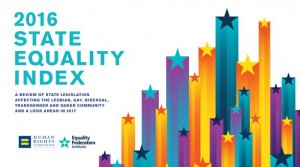 WASHINGTON – The Human Rights Campaign (HRC) Foundation in partnership with the Equality Federation, today released its third annual national report assessing the status of state legislation affecting LGBTQ equality across America, including in California.
WASHINGTON – The Human Rights Campaign (HRC) Foundation in partnership with the Equality Federation, today released its third annual national report assessing the status of state legislation affecting LGBTQ equality across America, including in California.
HRC’s State Equality Index reveals that in many states opponents of equality are ramping up efforts to sanction discrimination against LGBTQ people by proposing state-level laws that would undermine existing protections, erode marital rights of legally-joined same-sex couples, target transgender people — including youth — and limit the ability of cities and towns to pass their own inclusive laws.
California falls into the category, “Working Toward Innovative Equality.”
“State governments have a clear choice between sowing the seeds of division and discrimination or building an economy that works for everyone by fostering fairness and inclusion,” said HRC President Chad Griffin, “Unfortunately, too many lawmakers have decided to target LGBTQ people for state-sanctioned discrimination and to interfere with local protections for workers, customers, and residents. Now more than ever, it is crucial that legislators across the country stand on the right side of history and ensure full equality for all their citizens – nothing more and nothing less.”
“Now more than ever, California represents a beacon of hope for the rest of our country,” said Rick Zbur, executive director of Equality California. “Over the past two decades, the work of Equality California and its partners has given LGBT Californians the world’s most comprehensive laws protecting LGBT people. Guarding and elevating those laws is even more important following the results of November’s presidential election. We will work to strengthen LGBT civil rights protections over the next four years, and to oppose, both in California and in Washington, D.C., any attempts roll back the Affordable Care Act or to target LGBT people and the many communities of which we are a part.”
While more than 111 million people live in states where LGBTQ people lack clear state-level protections against discrimination in the workplace, the SEI points to a few encouraging signs — particularly in areas related to LGBTQ youth, health and safety and protections for the transgender community. States like Vermont and New York took steps to protect LGBTQ youth by banning conversion therapy. Massachusetts expanded the state’s non-discrimination law to include gender identity in public accommodations. Hawaii passed a law to make it easier for transgender residents to update their name and gender marker on a birth certificate or driver’s license. Five states, including Delaware, Hawaii, Maryland, Michigan and Pennsylvania banned transgender exclusions in health care insurance, a sizable increase from 2015.
The SEI assesses statewide LGBTQ-related legislation and policies, good and bad, in five areas: parenting laws and policies; non-discrimination laws and policies; hate crimes laws; youth-related laws and policies; and health and safety laws and policies. Based on that review, the SEI assigns states to one of four distinct categories.
Nine states and the District of Columbia are in the highest-rated category, “Working Toward Innovative Equality”
California, Colorado, Connecticut, District of Columbia, Illinois, Massachusetts, New York, Oregon, Vermont, Washington
These states and the nation’s capital have robust LGBTQ non-discrimination laws covering employment, housing and public accommodations, as well as protections in the areas of credit, insurance and jury selection. Most allow transgender people to change official documents to reflect their gender identity, and almost all bar private insurers from banning transition-related healthcare. LGBTQ youth are protected by anti-bullying laws, as well as innovative measures in some states that address conversion therapy, inclusive juvenile justice policies, homelessness and sexual health education.
Seven states are in the category “Solidifying Equality”
Delaware, Iowa, Maine, Minnesota, Nevada, New Jersey and Rhode Island
These states have non-discrimination protections and are considered high-performing, but have not yet adopted innovative equality measures. Many of these states allow transgender individuals to change gender markers on official documents and more than half do not allow second-parent adoption. These states have relatively robust anti-bullying laws, but bad laws begin to crop up in this category.
Six states are in the category “Building Equality”
Hawaii, Maryland, New Hampshire, New Mexico, Utah and Wisconsin
These states have taken steps toward more robust LGBTQ equality, including passing basic non-discrimination and hate crimes laws. They allow gender markers to be changed on official documents, but have few protections guaranteeing access to transgender health care. Some lack explicit gender identity protections and several lack comprehensive anti-bullying laws. Bad laws are more common, so advocates are working to stop bills that could undermine LGBTQ equality and pass more comprehensive non-discrimination laws.
Twenty-eight states are in the lowest-rated category “High Priority to Achieve Basic Equality”
Alabama, Alaska, Arizona, Arkansas, Florida, Georgia, Idaho, Indiana, Kansas, Kentucky, Louisiana, Michigan, Mississippi, Missouri, Montana, Nebraska, North Carolina, North Dakota, Ohio, Oklahoma, Pennsylvania, South Carolina, South Dakota, Tennessee, Texas, Virginia, West Virginia and Wyoming
Most of these states, including Arizona, North Carolina, South Dakota and Florida, have many laws that undermine LGBTQ equality, from those that criminalize HIV and sodomy, to measures allowing religious-based discrimination against LGBTQ people. None have non-discrimination laws that explicitly include sexual orientation or gender identity protections; few have hate crime laws with those protections. LGBTQ advocates largely work to defeat bad bills and pass municipal protections for LGBTQ people.
The full report, including detailed scorecards for every state, as well as a comprehensive review of 2016 state legislation, is available online at www.hrc.org/sei.











